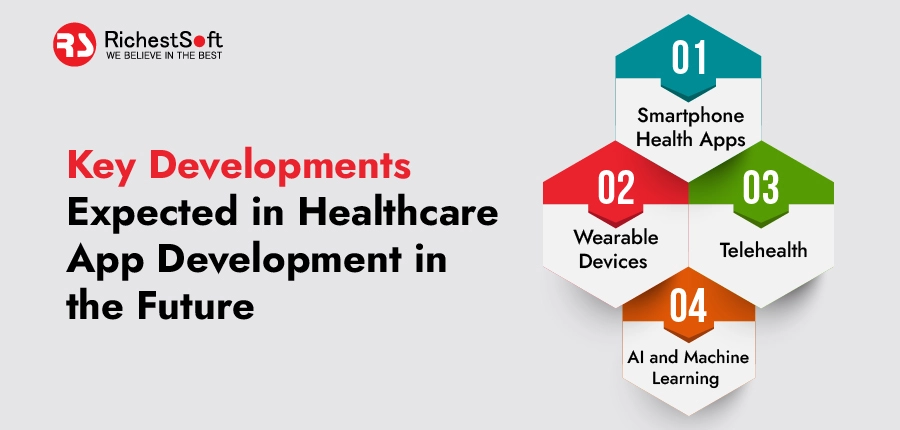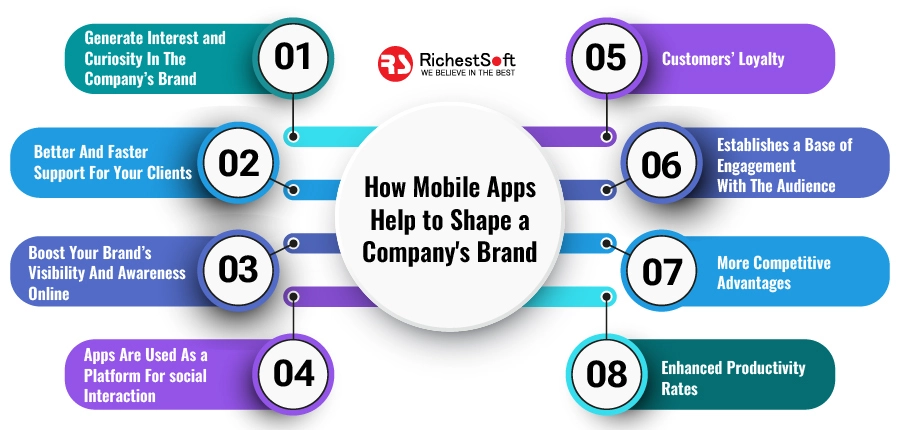Healthcare app development is a rapidly growing field. With the development of digital technology, more patients are turning to apps to make healthcare decisions. Some estimations suggest that health apps are becoming increasingly popular among patients due to their comfort and accessibility.
From symptom trackers and virtual doctor appointments to diagnostics and medication reminders, there are numerous ways that healthcare apps are changing how we access healthcare services. In this blog, we will look at how Healthcare App Development is transforming the industry and what it could suggest for the future of healthcare.
Overviews of Healthcare App Development
As technology develops rapidly, healthcare app development is becoming increasingly significant within the medical sector. It will be fundamental for providing top-notch patient care, cutting costs, and augmenting efficiency.
Healthcare entities must be ready to adopt this leading-edge technology and apply it to better patient outcomes, reduce expenses, and simplify operations. The appropriate healthcare app development tactic can help healthcare organisations utilise this technology to make more informed decisions, furnish superior-quality care, and improve patient experiences in a more cost- and time-productive way.
In the coming years, healthcare app development will focus on providing a better patient experience, improved care coordination, and greater access to medical information. It will also focus on making healthcare more efficient and cost-effective.
Key Developments Expected in Healthcare App Development in the Future
1. Smartphone Health Apps:
Smartphones are evolving to become increasingly famous for healthcare apps. They are easy to use and fast become the go-to device for people accessing health information. We expect more smartphones integrated into healthcare apps, allowing easier patient data access. Smartphones can also be used to take patient photos, track vital signs, and provide real-time monitoring of medical requirements.
2. Wearable Devices:
Wearable technology is evolving and increasingly popular in healthcare and will continue growing in the future. Wearable devices can track vital signs, measure heart rate, and provide medical feedback. In addition, they can be used to monitor movement, helping patients with chronic conditions track their progress over time.
3. Telehealth:
Telehealth is becoming an increasingly popular medical care method. This technology will continue to evolve and become even more widely used. Telehealth can decrease wait times and provide patients with instant medical care access. This can enhance patient outcomes, save time, and lower costs.
4. AI and Machine Learning:
AI and machine learning are evolving and increasingly popular in healthcare. In the future, we expect to see more AI and machine learning used in healthcare apps. AI-driven apps can help physicians diagnose patients more accurately and fast, enhancing care quality.
Healthcare app development in the future will revolutionise the healthcare industry. It will help healthcare organisations to improve patient care, decrease costs, and improve efficiency. With the proper tools and technology, healthcare can become more accessible, practical, and affordable.
Also Read: Top 20 Mobile App Development Trends for 2023
Types of Healthcare Apps

Healthcare apps are revolutionising the method we receive care. From tracking medications to providing access to medical records, healthcare apps offer various services that make it easier to remain healthy and manage chronic conditions. With the rise of mobile technology, it is no wonder that healthcare apps are becoming increasingly popular.
Several healthcare apps are designed to provide various types of services. Here is a look at some of the most prevalent healthcare apps and how they can help you maintain your health.
1. Medical Records Apps
These apps permit patients to maintain and access their medical records from anywhere. Patients can consider their medical history, doctors’ notes, and lab test results, helping them better manage their health. Medical records apps also authorise patients to share their medical data with healthcare providers and doctors securely. Some example of medical records app are : MyChart, healowhelp
2. Virtual Care Apps
Virtual care apps deliver fast and convenient access to doctors or hospitals. Patients can connect with their doctor via video conference or telephone, providing a suitable way to receive medical guidance without visiting a doctor’s office. Virtual care apps help those who have busy timetables and can not visit a doctor’s office.
3. Prescription Management Apps
Prescription management apps authorise patients to maintain track of their prescriptions or medical records. They can be used to set reminders for taking medicines, store prescriptions, and even order supplies online. With pharmaceutical management apps, patients can confirm they take their medicine accurately and be warned of any potential dealings with other drugs.
4. Disease Management Apps
Disease management apps help patients manage their normal conditions by providing information and resources. These apps deliver educational information regarding the disease and help patients prevent their symptoms and progress. They can also connect patients with help groups and other resources.
5. Mental Health Apps
Mental health apps provide users with access to mental health experts and resources. These apps can be used to help people handle stress, anxiety, and depression or to find help for specific mental health issues. Mental health apps can also deliver details about self-care and other treatments.
6. Health Tracking or Fitness Apps
Health tracking or fitness apps allow users to follow their health and fitness goals. These apps can follow the diet, exercise, weight, and other fitness metrics like heart rate and blood pressure. By overseeing their health, users can determine any possible health issues and take steps to enhance their well-being.
With so many healthcare apps, patients can fast and conveniently remain on top of their health. From medical records to mental fitness, these apps provide a broad range of services that make management and enhancing health more manageable. Some example of Health tracking or fitness apps are: Samsung Health, Google Fit, fitbit
Also Read: Top 15 Mobile App Development Trends That Will Rule the Market in 2023
Benefits of Healthcare App Development

The healthcare sector is continuously pressured to enhance patient outcomes and reduce costs. Creating a healthcare app can fulfil both of these objectives. Here are the specific benefits of healthcare app development:
1. High patient engagement: Healthcare Apps can help patients engage more in their health, fitness, and treatment plans. It can lead to better patient health outcomes, as patients are more likely to stick to their treatment plan and take their medications as prescribed.
2. Enhance communication between doctors and patients: Healthcare Apps can help better patient communication. It can lead to improved coordination of supervision and better overall patient satisfaction.
3. Reduced costs: Healthcare apps can help reduce the costs associated with old care delivery processes, such as face-to-face visits and paper records. In addition, healthcare apps can assist in improving patient compliance with their treatment plan, also decreasing costs.
4. High accuracy and quality of care: Healthcare Apps can help reduce record mistakes and provide real-time data for more precise diagnoses. It can guide adequate quality care overall.
5. Improved access to care: Healthcare Apps can provide convenient remote access to healthcare services providers, reducing the need for patients to take time off work or travel long distances for doctor appointments. It can improve patient access to care, particularly in rural or semi-urban areas with limited medical facilities.
Must-Have Features in a Healthcare App

Healthcare apps are becoming increasingly popular as they provide easy access to medical services, from scheduling appointments to tracking medical records. With the rise of healthcare apps, understanding what features to look for when choosing one is essential.
To be the most valuable and practical, a healthcare app should have the following features:
1. Easy Registration: Registering for an app should be quick, easy, and safe. It should require minimum personal details and allow users to register fast with a simple verification method.
2. Appointment Scheduling: Patients should be able to schedule appointments with their healthcare provider via the app. This should include an easy-to-use scheduling technique to check availability and book appointments.
3. Messaging: Healthcare apps should have a safe and secure messaging feature that allows patients to communicate easily with their healthcare providers or doctor. This feature should also authorise the provider to send reminders and notifications to the patient.
4. Notifications: Notifications are crucial in healthcare apps. These should include appointment reminders, notifications when the patient’s medications are ready, and other essential health-related alerts.
5. Payments: Healthcare apps should offer safe and secure payment methods to facilitate the payment of medical services. This should include the integration of payment gateways, such as PayPal, Visa, Rupay, and Stripe.
6. Records Management: A healthcare app should access the electronic management of patient records. It includes storing and accessing medical history, lab results, insurance details, etc.
7. Doctor Locator: Patients should be capable of searching for and finding a doctor in their area more quickly. The app should include a complete guide of healthcare providers and allow users to search based on location, doctor reviews, and specialty.
8. Reviews: Reviews are an essential part of any healthcare app. This feature should allow patients to write a review of their provider’s services and deliver feedback on their experiences.
Having the right features in a healthcare app can create a difference in the quality of the service and user experience. When choosing a healthcare app, users can guarantee they are getting the best possible service by keeping these must-have features in a sense.
Developing a Healthcare App
As healthcare technology evolves, the demand for healthcare apps is rising. Developing a healthcare app has become essential for healthcare organisations to provide quality services to their patients. A healthcare app can enable health professionals to monitor and track patient health, provide real-time access to healthcare services, and even provide telemedicine services.
Developing a healthcare app is no small task. It requires detailed planning, research, and attention to detail. Here is a step-by-step guide to help you create a healthcare app that meets the needs of your patients and healthcare organisation.

Step 1: Identify Your Goals
Before you can start developing your healthcare app, you need to define the scope and purpose of your app. Consider the various needs of your patients and how your app can help address those needs. Ask yourself: What features would make it easier for patients to access healthcare services? What information do patients need to track their health? How can my app help improve the quality of healthcare services?
Step 2: Research Technology & Trends
Once you have established your goals, you will need to research the latest technology and trends in healthcare technology. Consider the various tools and technologies available to help you develop your app. For example, explore cloud-based solutions, mobile-friendly design, and security measures.
Step 3: Develop a Prototype
With your research complete, it is time to develop a prototype of your healthcare app. It will help you identify any potential issues or technical challenges you may encounter during development. Testing the functionality of your app is essential to ensure it meets your expectations.
Step 4: Design & Test
Now it is time to design and test your healthcare app. During this step, you must ensure your app’s user interface is intuitive and comfortable. You will also need to consider the different devices and platforms your app will be available on. Additionally, testing the app thoroughly before making it available to the public is essential.
Step 5: Launch & Monitor
Once your app is ready for launch, you must monitor its performance in the marketplace. Track your app’s downloads and usage to determine how well it is being received. Additionally, you must respond to any feedback or issues users may have with the app.
Developing a healthcare app is complex, but it can be satisfying. With careful planning and awareness of detail, you can create a healthcare app that meets the needs of your patients and organisation.
FAQs
Q: What is healthcare app development?
A: Healthcare app development is creating, designing, developing, and launching mobile applications specific to the healthcare sector. These apps can be used for different purposes, such as managing medical records, appointing doctors via video conference or telephone, tracking health metrics, and providing educational resources.
Q: Why is healthcare app development significant?
A: Healthcare app development is crucial because it can help to enhance patient care and outcomes by delivering access to information and resources that can aid in decision-making. Also, healthcare apps can improve efficiency and collaboration among care providers.
Q: Who can benefit from healthcare app development?
A: Both patients and supervision providers can benefit from healthcare app development. Patients can use apps to track their health metrics, access educational resources, and manage their medical records. Health Care providers can use apps to cooperate with other providers, track patient data, and schedule doctor appointments.
Q: What technologies are used in healthcare app development?
A: Healthcare app development generally combines artificial intelligence, natural language processing, cloud computing, mobile device management, and machine learning. Also, developers may use frameworks such as React Native, Flutter, Swift, HTML5, CSS3, and JavaScript.
Also Read: Mobile App Marketing – An Ultimate Guide
Conclusion
Healthcare app development has revolutionised healthcare delivery, benefiting patients and healthcare specialists. With the growing demand for mobile solutions in the medical sector, now is an ideal time to explore building your visionary healthcare solution. Whether you need help developing a standalone mobile application or integrating existing systems with APIs and databases, many options are available to start your journey into digital health. Are you looking to build a secure, robust Healthcare app with next-generation features? Contact RichestSoft Today.







Leave a Reply